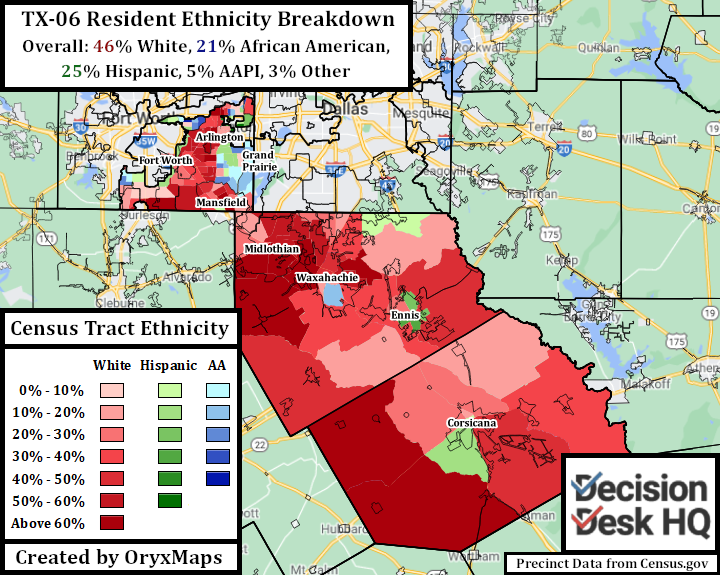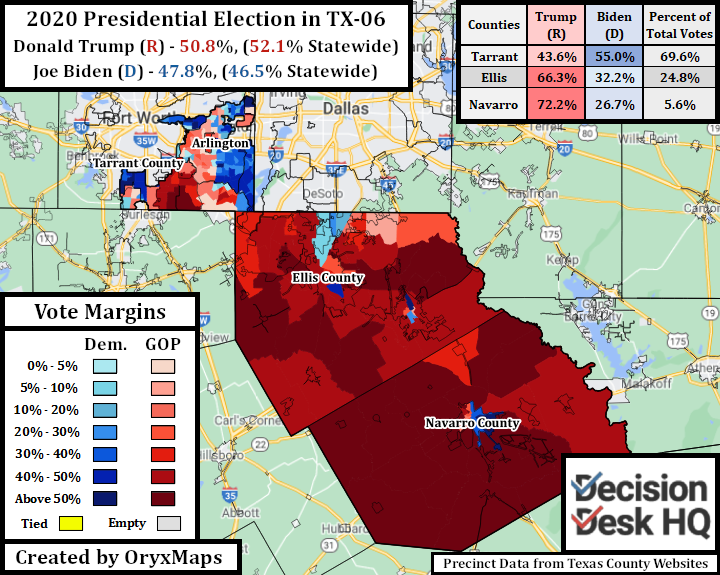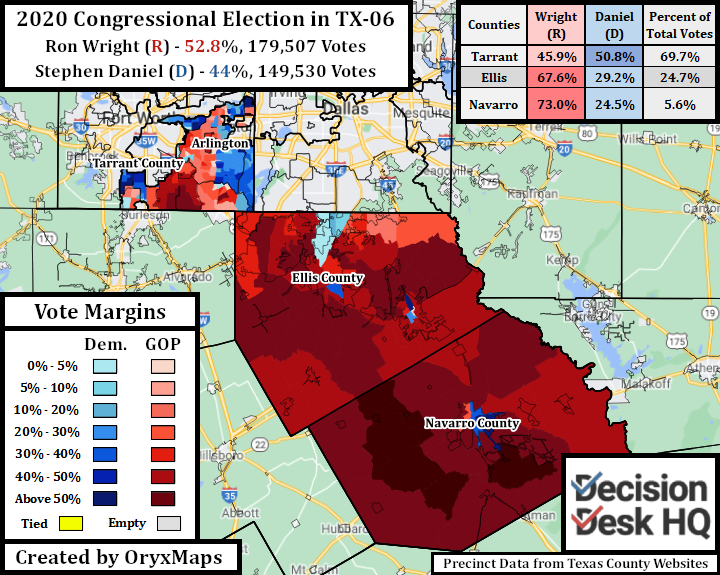Voters in Texas’s Sixth Congressional district vote this Saturday, May 1, to decide who they wish to replace their late Representative Ron Wright. Wright had pre-existing lung cancer and died from COVID-19 complications on February 7, 2021. Wright’s passing necessitated a special election to finish his term. Voters can choose between 23 candidates – eleven Republicans, ten Democrats, one Libertarian, and one Independent – in this blanket or “jungle” primary. The top two candidates move on to a runoff if none of the 23 can win a majority of the vote. The large number of serious candidates all but ensures a runoff and there is a realistic possibility that one party’s voters will not congregate towards a single candidate and thus lock their party out of the runoff.
The District
Texas’s Sixth Congressional District can be separated into two distinct regions. A majority of residents live in Tarrant County just west of Dallas. This piece contains nearly all of the upscale suburb Arlington, Tarrant County’s portion of diverse Grand Prairie, outlying Mansfield, a few neighborhoods in Fort Worth, and a scattering of other, smaller communities. A majority of TX-06’s Tarrant County residents are non-White, and the minority population is close to evenly divided between Hispanic residents and African Americans. The Tarrant County portion favors the Democrats, but this support is geographically concentrated in the eastern side of the county closest to Dallas.

Approximately 30% of TX-06 voters live in the other region: Ellis and Navarro Counties, both just south of the Dallas-Fort Worth Metroplex. Close to 60% of these two counties’ residents are White, and the combined voting age population is almost 70% White. Suburban Ellis County has a median household income almost $10K higher than TX-06’s section of Tarrant County, but the more agrarian Navarro County has the lowest median income of the three counties. Ellis and Navarro Counties solidly favor the GOP. Former President Trump carried Ellis with 66.3% of the vote to President Biden’s 32.2%, and Trump won Navarro with 72.2% of the vote to Biden’s 26.7%.

TX-06 did not escape political realignment. Nine Republican-held, and eleven total, Texas Congressional districts drawn to elect Republicans are now marginal seats, including TX-06. The underlying trends of suburban growth, diversification, and voter realignment shifted Texas’s suburbs and their districts from safely GOP onto the battleground. Ted Cruz won TX-06 by a margin of 3.2% in 2018 – 51.2% to Robert “Beto” O’Rourke’s 48% – and former President Donald Trump won it by a margin of 3%, or 50.8% to President Biden’s 47.8%.

What separates TX-06 from the rest of the competitive Texas Congressional districts is how much the district’s Democratic coalition depends upon lower income minorities. Suburban voter transition is important, but the key to increasing Democratic opportunity in TX-06 is minority voter growth in Grand Prairie and the eastern side of Arlington. Southwestern Democratic parties, including the Texas Democrats, historically have difficulty convincing minority voters to vote in off-cycle elections. Southwestern special election Democrats rarely match the presidential topline. Republicans tend to over-perform in off-cycle elections and occasionally win upsets. Texas Republicans know this, which is one reason why Governor Abbott scheduled the blanket primary for Saturday.
The Candidates
Only a few of the 23 candidates have a serious chance at advancing to the runoff. Some run to represent the district, some run to raise their name recognition for future campaigns, and some run just because they can. Leading the divided field is Susan Wright, representative Ron Wright’s widow. Susan Wright is a member of the State Executive Republican Committee and her candidacy has won the endorsement of numerous prominent local and national Republican politicians. This includes Betsy Price, the Mayor of Fort Worth, and Kay Granger, the current representative for the neighboring 12th Congressional district. Former President Donald Trump gave Wright his endorsement on April 26. The two recent polls of this race found Wright would advance to the runoff with 22% and 15% of the vote respectively.
Wright’s weak lead over the field, and her inability to consolidate her position as the top Republican nominee allows other Republican candidates to vie for the runoff. One such Republican is Jake Ellzey, the current State Representative for Ellis County. Ellzey was one of several Republicans who attempted to replace Representative Joe Barton after he succumbed to scandal and retired in 2018. Ellzey made the Republican primary runoff against former Representative Ron Wright, but lost the runoff election by a margin of 4.4%. Ellzey is viewed as the most viable alternative to Wright, and has the endorsement of former governor Rick Perry. He has come under attack from Wright’s allies, and Ted Cruz told Republican voters not to vote for Ellzey.
Another prominent Republican is Brian Harrison, a former Chief of Staff in Trump’s Department of Health and Human Services. Harrison attracted attention when he used his past experience to launch a lawsuit against his Biden administration successors. Harrison argues that Washington’s decision to admit migrants at the border breaks Trump’s Title 42 Order barring migrants from entering the country, issued to prevent cross-border Coronavirus transmission.
Campaigning in the opposite direction as an anti-Trumpist is Marine Corps veteran Michael Wood. Wood is a conservative Republican who voted for Trump in 2020, but argues that all of Trump’s actions since the 2020 election have hurt the GOP and it is time for the party to move beyond the former President. Wood’s position earned him the endorsement of the prominent anti-Trumpist Congressman Adam Kinzinger and the Dallas Morning News.
Then there are the Republican candidates known for the wrong reasons. Republican Congresswomen Young Kim and Michelle Stelle, both Korean Americans, previously endorsed Korean-American and former Small Business Association assistant administrator Sery Kim. Both withdrew their endorsements on April 2 after Kim made anti-Chinese remarks at a forum for the GOP candidates, and then argued that she could make those statements because she is Korean. Former WWE wrestler Daniel Rodimer carpet-bagged to Texas after he lost a 2020 campaign for Nevada’s 3rd Congressional district. Rodimer has since put out an ad that tries to tie him to Texas culture and the Texan electorate. Other minor Republican candidates include: Green Beret veteran Mike Egan, businessman John Anthory Castro, who took 4.5% of the vote against Cornyn in the 2020 Republican primary, former candidate for the Austin-based TX-35 Jennifer Garcia Sharron, police officer Travis Rodermund, and Arlington lecturer Michael Ballantine.
Ten Democratic candidates also crowd the field of potential replacements. Three Democrats lead the field: Jana Sanchez, Lydia Bean, and Shawn Lassiter. Sanchez was the 2018 Democratic nominee against Ron Wright; 45.4% of 2018 voters voted for her rather than the Republican. Sanchez has since worked to recruit female Democratic candidates in the Dallas-Fort Worth Metroplex. Sanchez has the endorsement of the Latino Victory Fund. Both of the jungle primary polls have Sanchez advancing to the runoff with Wright. Lydia Bean is a University of Texas at Arlington research associate. She was the 2020 Democratic nominee for Texas House District 93 in North and Eastern Fort Worth, and she is endorsed by the Tarrant County AFL-CIO. Lassiter is one of two African American Democratic candidates and previously worked at the Texas education nonprofit, Leadership ISD. Lassiter was a candidate for the Fort Worth city council but swapped races during the winter power crisis in mid-February.
Trailing the prominent Democrats are seven less notable candidates. These include realtor Manuel Salazar, paramedic Chris Suprun, systems engineer Brian Stephenson, Grand Prairie Attorney Tammy Allison Holloway, Mansfield pastor Patrick Moses, businessman Daryl J. Eddings Sr, and Dallas developer Matt Hinterlong. Rounding out the field is the Libertarian Patrick Grey and Independent Adrian Mizher.
The Ratings
The analyst consensus is that the TX-06 special election favors the GOP. Texas Democratic campaigns dependent on minority turnout historically struggle in off-cycle elections, and TX-06 is still a Trump 2020 district. The hot-button culture war issues presently favor the GOP, especially in Texas. The winter power crisis is fading from memory. Sabato’s Crystal Ball currently rates the special election as Likely Republican. Inside Elections rates TX-06 as Leans Republican. Both recent polls found Republican majorities in a hypothetical runoff matchup. Which Republican of the eleven is favored though remains up in the air.
Ben Lefkowitz (@OryxMaps) is a Contributor to Decision Desk HQ.